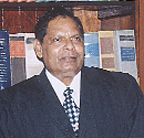Recognising the need for greater press freedom and the importance of free speech to good governance, Jamaica has embarked on a serious review of its defamation laws–a move being applauded by local experts who say there is need for a similar approach here.
A committee chaired by Justice Hugh Small, was appointed by Jamaican Prime Minister Bruce Golding in 2007 to re-evaluate the slander and libel laws, similar to those contained in Guyana’s Defamation Act and the Criminal Law (Offences) Act which make provision for defamatory libel. What has driven reforms is the modernisation of laws in other common law jurisdictions–in no small part due to greater emphasis on freedom of expression–and, more recently, the emergence of new media, such as podcasts and webcasts.

The Joint Select Committee in the Jamaican Parliament has started examining the recommendations of the reform committee, which was enjoined to “make recommendations for changes that will ensure transparency and accountability in the context of good governance.” In the report, the committee recognised the urgent need to give high priority to these principles in the private and public business culture. “Traditionally the law of defamation is not focused on supporting the enforcement of standards of accountability and governance,” the committee noted, pointing out that the law has been fundamentally concerned with providing redress for persons who allege that their reputations have been disparaged. “Nevertheless we accept that there has been a modern tendency in the law of defamation to accommodate the right to freedom of expression,” it added.
In Guyana, slander and libel were consolidated by the 1959 Defamation Act. Internet radio and news blogs are among the new platforms that are complementing traditional print and broadcast media. And the introduction of Freedom of Information (FOI) legislation is pending pointing to recognition of the need for a review of the law.

Sacred cows
According to attorney-at-law Moses Nagamootoo, Guyana’s laws are deficient and should be reviewed. Nagamootoo, who has also been a journalist, says the existing laws are past their time and need to be brought into line with modern legislation, where people in public life do not believe that they are sacred cows. “While the right to privacy must be protected,” he said, “the right to freedom of expression is so cardinal to good governance it requires a radical look at existing legislation.”
Journalist Denis Chabrol favours a “careful application” of the law in the case of public officials, who he says by the very nature of their work they should be held to “a higher degree of scrutiny” by the media as intermediaries between the masses and the decision makers. Though he emphasises that the press must be truthful, guarding against malice and recklessness, he says “the overriding interest is the public’s interest” and “the responsibility that elected officials have to the public,” which either pay or elected them. A careful application of the law in the case of public officials, he says, will require continuing education for the bench, the bar and media workers.
Chabrol, the current President of the Guyana Press Association (GPA), thinks the existing defamation legislation is an inhibition to press freedom as it has the potential to curtail robust and even highly sensitive criticism of public officials. “The reality is that such [criticism] comes with the territory of their office [they] cannot be on par with …an ordinary citizen,” he says.
He explains that in Guyana, as in many other parts of the world, politicians and other high-level decision-makers seek to “muzzle the media” by filing defamation suits to avoid the future and/or repeated publication of what may in fact be a very robust perspective or deep criticism of their character and suitability. Even the interpretation of trends and behavioural patterns of public officials may be regarded as defamatory, Chabrol points out.
It is in this context of the need to ensure free speech that he does not believe that new media platforms should be subjected to new laws. “…The [fewer] laws we have, the less restrictions there will be on free speech,” he says, while cautioning that new platforms should not be abused to propagate hate-speech and foment public disorder. In this regard, he says there are already protections available in the Racial Hostility Act as well as the Public Order Act and laws treating with public mischief, which may provide scope for dealing with such offenders once they are identified.

Chabrol also said that the impending introduction of Freedom of Information legislation would be an incentive to reviewing the defamation law, since information accessed might provide factual basis for criticism of the peoples’ representatives and other high-level officials.
Tolerant of scrutiny
Attorney-at-law Teni Housty says the laws need to be updated, but a balance must be maintained between the right to freedom of expression and the protection of privacy. Housty explains that the defamation laws can operate as a form of censorship as the possible threat of libel suits could prohibit the vigorous pursuit of some issues. “They [the press] don’t want censorship imposed because there is supposed to be a responsibility of the press in dealing with truth and value of information,” he says. “The problem is the structure of access to information is poor.”
He says the real drivers of reform, however, are advances in technology that require legislative adjustments as well as the evolution of freedom of expression. Under Article 146, the Constitution offers Protection of Freedom of Expression, saying “no person shall be hindered in the enjoyment of his freedom of expression, that is to say, freedom to hold opinions without interference, freedom to receive ideas and information without interference, freedom to communicate ideas and information without interference and freedom from interference with his correspondence.”
Housty drew a comparison between the evolution of freedom of expression and that of human rights advocacy which has led to challenges of the constitutionality of the death penalty in the Caribbean. “What drives this is the evolution of society,” he explains.
Housty notes the argument that once persons step into public life they should be more tolerant of scrutiny as well as the suggestion that there be a relaxation of defamation laws. However, he notes that freedom of expression as set out in the Constitution would still be subject to the defamation laws that existed long before. “The rights in the Constitution are not absolute,” he points out. “They are subject to these other laws.” Indeed, Article 146 (2) (b) makes exception of laws that protect “reputation, rights and freedoms of other persons” as well as the “private lives of persons concerned in legal proceedings.”
Further, Housty says some of the recent legal cases have recognised the importance of reputation and the necessity of balance. However, he adds that not many judgements have been written to sensitise persons about the issue.
The Jamaica reform recommendations are wide ranging. The committee agreed that the distinction between slander and libel ought to be abolished and replaced with a single civil action of “defamatory publication” that requires no proof of special damages to be established. Further, it said the common law offences of criminal libel, including blasphemous, obscene and seditious libel should be abolished. Also, it noted the need for various media by which statements could be published, which would include wired and wireless means as well as new media, like streaming webcasts and podcasts be recognised.
According to the committee, the limitation period for a defamation action should be reduced to one year from the publication of the statement (but with provisions fixing an appropriate formula for the extension of that period by the court where the interests of justice so require).
The defence known as “justification,” the committee agreed, should be replaced by the defence of “truth.” It explained that where an action for defamation is brought in respect of the whole or any matter published, the defendant may allege and prove the truth of the any of the charges contained in that publication, and the defence of truth will not fail by reason only that the truth of every single charge is not proved if the matter, taken as a whole or that the publication does not materially injure the plaintiff’s reputation having regard to any such charges which are proven to be true in whole or part.
Another suggested defence is “triviality,” in circumstances where the publication is of the matter complained of was such that the person defamed is not likely to suffer harm to his reputation. Also, a defence of “an offer of amends,” similar to that in the Barbados Defamation Act is proposed. An offer of amends, the committee noted, would be for the publication of a suitable correction of the statement complained of and for a sufficient apology for the aggrieved person. It added that the offer would not be available to a person after a defence has been served and that it would also be possible to withdraw the offer at any time.
A defence of innocent dissemination, similar to that contained in the harmonised defamation statutes of Australia, is also proposed in the committee report.
The committee agreed that a publication of an apology would not be construed as an admission of a liability and would not be relevant to the determination of fault. However, it added that it would be relevant to the determination of damages and possibly to the defence of amends.
Also proposed is that a new remedy of a declaratory order should be established, for which a plaintiff may apply, instead of damages for the purpose of offering redress where the only issue is the wish of the plaintiff to have acknowledgment that the matter in question was defamatory and false as it related to him or her. Further to this, the committee recommended a correction order to enable a court to order the publication of a correction as an additional remedy to declaratory judgements and to allow the courts to direct the terms of any correction that may be made in the favour of a plaintiff.
In court actions, the committee agreed that the role of the jury is to find whether the defamatory matter was published by the defendant and whether any defence has been proven while the judge would be responsible for assessing the amount of compensation that would be awarded. (The committee noted that the removal of trial by jury in defamation cases was proposed by representatives of the Press Association and Media Association.) It also called for provisions for the assessment of General Damages to be introduced that would require the judge to have regard to all the circumstances of the case, including the means of publication and the gravity of the allegations; the extent to which the defamatory statement was circulated; the offer, timing or making of any apology, correction or retraction by the defendant to the plaintiff; the importance of the plaintiff’s reputation in the eyes of a particular or of all the recipients of the defamatory statement; and evidence given concerning the reputation of the plaintiff.





